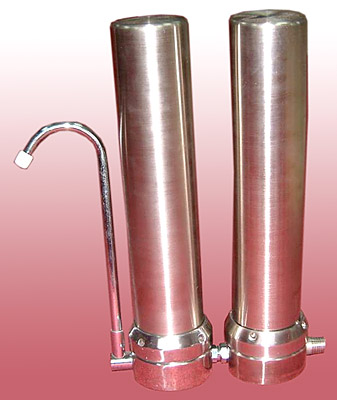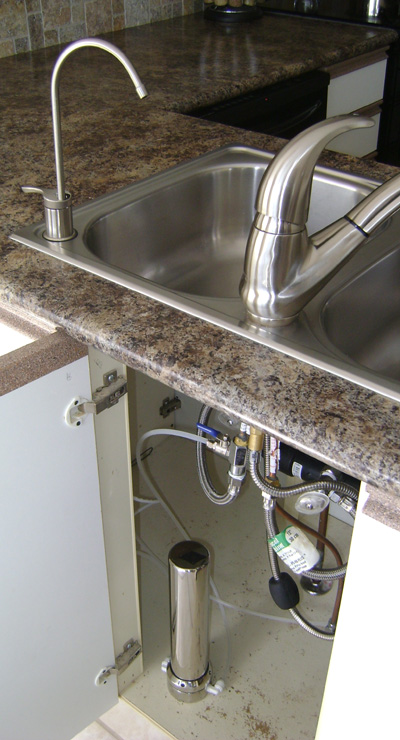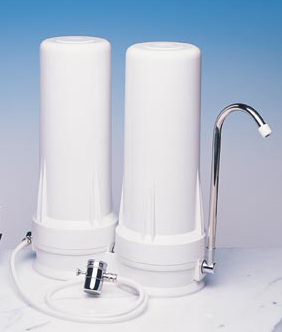|
How do I reduce my fluoride exposure?
WATER PURIFIERS: A home water purifier is the most affordable and effective way of removing fluoride from your tap water. However, most water filters will not effectively remove fluoride. For instance, Brita filters will NOT remove fluoride. The two types of filters which will reliably remove 93-95% of the fluoride are reverse-osmosis filters and activated alumina filters. Thus, if you are looking for a filter to remove fluoride, make sure it uses "reverse-osmosis" or "activated alumina" technology.
Our Reverse Osmosis systems are the most advanced and affordable on the market. Our undersink RE-mineralizing RO systems start at $849. Competitors sell similar systems for over $3400.
Our Activated Alumina , or also called aluminum oxide, filter cartridges are the most affordable option for removing fluoride. They remove 95% of the fluoride in your water. We recommend pairing an activated alumina fluoride cartridge with a 4-stage filter cartridge. To not only remove Fluoride but hundreds of other contaminants. For example the Double Countertop Fluoride Filter. It attaches easily to any faucet, just replace the aerator and enjoy fresh clean water in minutes!
Our Activated Alumina filters also come in Stainless Steel or Under the Sink .
 
What else can I do to minimize fluoride exposure for myself and my family?
1) If you're using a fluoridated toothpaste, consider switching to a non-fluoridated alternative (which you can find at most health food stores or at www.storeonline.ca). Young children, who don't have well developed swallowing-reflexes, often swallow a lot of toothpaste when brushing, which can cause disfiguring dental fluorosis and contribute greatly to total systemic intake. Also, even when the toothpaste is not swallowed, the fluoride may cross the gum membrane and enter the bloodstream.
2) If your child is using infant formula, it is imperative to avoid making the formula with fluoridated tap water. Infant formula reconstituted with fluoridated water delivers a very high dose of fluoride to a young baby. For instance, infant formula produced with fluoridated water contains 100 to 200 times more fluoride (1,000 ppb) than is found naturally in breast milk (5-10 ppb). In fact, while breast-fed infants receive the LOWEST body burden (mg/kg/day) in the population, they receive the HIGHEST body burden if they receive fluoridated formula.
3) Minimize consumption of processed beverages (e.g. soda and reconstituted juice). Soda and juice made from concentrate are often manufactured with fluoridated tap water, and hence, have fluoride levels similar to fluoridated water.
4) If you regularly drink non-organic wine or grape juice consider buying only organic varieties. Many commercially-grown grapes in the US are sprayed with a fluoride pesticide called Cryolite. The residues of this pesticide can result in high levels of fluoride in wine or grape juice. In the case of wine, if you don't want to spend the extra money buying organic, consider purchasing a European brand instead of a Californian brand, as Europe uses much less cryolite on its vineyards.
5) Be careful of drinking too much green or black tea. Tea almost always has elevated levels of fluoride and can contribute a substantial amount to one's total fluoride intake.
6) Minimize consumption of mechanically-deboned chicken. Mechanically deboned chicken (e.g. "Chicken McNuggets") has been found to contain elevated levels of fluoride due to the incorporation of ground bone particles (which are high in fluoride) into the meat.
7) If you live in a country which allows fluoridated salt to be sold, make sure that the salt you buy is unfluoridated. Consumption of fluoridated salt can greatly increase a person's fluoride exposure.
8) Check to see if any prescription medicines you are taking contain fluorine. If so, ask your doctor if there are any appropriate alternatives - as some fluorine-containing pharmaceuticals (e.g. Cipro) can metabolize into fluoride ion within the body, thereby increasing the body's exposure to fluoride.
9) If you are going to have surgery, ask your doctors if they can use a non-fluorinated anesthetic. Fluorinated anesthetics such as Enflurane, Isoflurane and Sevoflurane will produce high peak levels of fluoride in blood for up to 24 hours.
10) Avoid the use of teflon-coated pans. Teflon-coated pans may increase the fluoride content of food. Ideal cookware is made of surgical steel.

|

